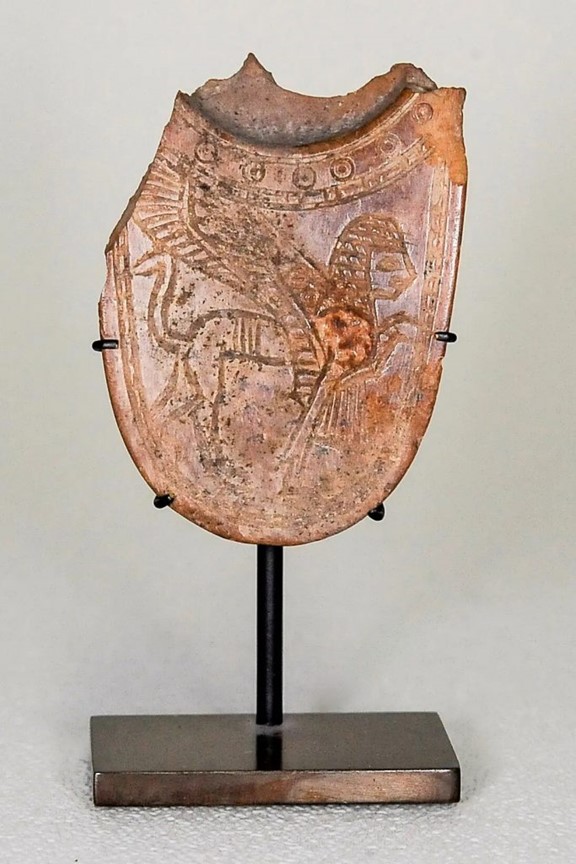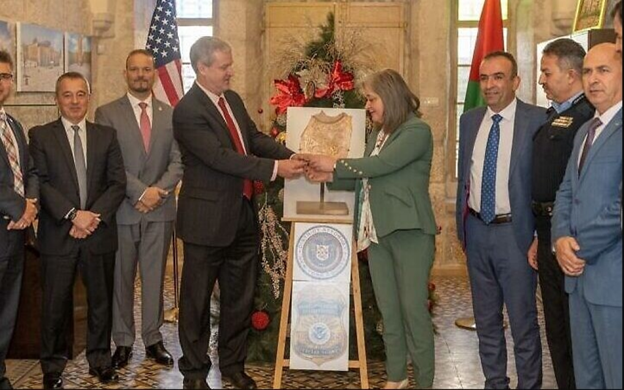U.S. Returns Ancient Assyrian Artifact to Palestinian Authority, Causing Ruckus in Israel

By: John Mason / Arab America Contributing Writer
The U.S. Office of Palestinian Affairs recently returned to the Palestinian Authority a rare Assyrian ceremonial spoon almost 3,000 years old. On being looted from a site near the Palestinian village of Khirbet al-Koum, the Iron Age spoon ended up in the hands of a Manhattan antiquities collector. Israeli reporting on the return of the looted artifact differed sharply from outside reports. One such story was titled, “US spoon-feeds the Palestinian Authority a looted artifact.”
The Story at Face Value: U.S. Repatriates Cultural Antiquity to Palestinian Authority
The U.S. Office of Palestinian Affairs, on Thursday, January 5, presented the Palestinian Authority with a rare cultural object. The object was a ceremonial spoon dating to a period of Assyrian civilization 700-800 B.C. That made it almost 3,000 years old. The spoon was used to ladle incense onto fires and braziers at rites venerating the gods and the dead. It is carved from ivory, with an etched winged figure on its front side. Criminal investigations show it was stolen from an archaeological site in the Khirbet al-Koum area of Hebron by antiquities trafficking looters and smugglers.
As the U.S. Office of Palestinian Affairs reported, the return of the Iron-age cosmetic spoon “is the first ever event of such repatriation from the United States to the Palestinian Authority in history, during which U.S. and Palestinian officials shared their mutual respect and appreciation for cultural heritage and history, acknowledging the importance of cultural exchange in strengthening the U.S – Palestinian relationship.”
First Time U.S. ever Returned Looted Antiquity to Palestine
Upon being looted from the Palestinian village site, the Iron Age spoon ended up in the hands of a Manhattan antiquities collector. According to artnetnews.com, the spoon “is one of 180 stolen antiquities, collectively valued at $70 million, that the Manhattan District Attorney’s office seized from billionaire collector Michael Steinhardt.” The spoon had been in his hands since January 2003, when Steinhardt bought it from an Israeli antiquities dealer named Gil Chaya.

After a multi-year, multi-national investigation of Steinhardt, the Manhattan DA placed an unprecedented lifetime ban on him from collecting cultural antiquities. Artnetnews.com reported, “The severity of the penalty reflected the fact that Steinhardt spent decades working with smugglers to knowingly acquire stolen art. His pursuit of ‘new’ additions to showcase and sell knew no geographic or moral boundaries, as reflected in the sprawling underworld of antiquities traffickers, crime bosses, money launderers, and tomb raiders he relied upon to expand his collection.”
News source Dearborn.com reported, “As part of a deal to avoid prosecution, Steinhardt agreed in late 2021 to turn over $70 million worth of stolen antiquities that authorities claim were illegally acquired in Israel.”
A Ruckus in Israel over the Repatriated Palestinian Spoon
Reporting on the return of the looted artifact inside Israel was much different than outside reports. The Jewish News Service, for example, headed its story on the repatriation, “US spoon-feeds the Palestinian Authority a looted artifact.” JNS pointedly noted, “As the U.S. lauds the event as a ‘historic repatriation,’ there is no indication as to what makes this object culturally Palestinian.”
That same news service purposely clarified a certain timeframe surrounding the return of the artifact: “Modern concepts of ‘Palestine’ only began to emerge in the mid-19th century. It would not be until the mid-20th century—two decades after the birth of the State of Israel—that Arabs in the disputed territories would begin to show signs of a distinctive national identity.”

As we know, many national identities, especially in the Middle East, did not evolve until the 20th century, after colonial powers were pressured to withdraw from what became nations on their own—excepting Palestine. Even more emphatic is Israel’s military occupation of the Palestinians after the 1967 Arab-Israel war.
JNS further suggested that no evidence exists to suggest that the spoon is culturally Palestinian. Nevertheless, the head of the U.S. Office of Palestinian Affairs, George Noll, stated that it is an example of Palestinian cultural patrimony.
Besides the Israeli news service’s title about the U.S. “spoon-feeding” Palestinians, other provocative titles appeared in the Israel press. Two additional examples are, “Biden Helps Create Fake Palestinian History — Why bolster a phony Palestinian narrative that denies Jewish history and puts peace further out of reach?” and “Palestinians have a new symbol of resistance — the spoon.”
For Palestinians identifying with the Assyrian spoon as theirs, little things can mean a lot. For some Israelis, though namely the press, it is easy to belittle stories like this. The U.S. foray into the subject of cultural artifacts and possible links to national identity is perhaps compelling, though also curious. The U.S. would need to go a lot further in supporting the Palestinians if it were to advance the progress of a Palestinian identity worth the paper it’s written on.
John Mason, PhD., who focuses on Arab culture, society, and history, is the author of LEFT-HANDED IN AN ISLAMIC WORLD: An Anthropologist’s Journey into the Middle East, New Academia Publishing, 2017. He has taught at the University of Libya, Benghazi, Rennselaer Polytechnic Institute in New York, and the American University in Cairo; John served with the United Nations in Tripoli, Libya, and consulted extensively on socioeconomic and political development for USAID and the World Bank in 65 countries.
Check out our Blog here!









